
1 minute read
Nancy Pelosi Plans for governing in the
MADAM SPEAKER
DUFFY: Thank you so much for being with us, especially given all that is going on there in Washington and all that’s on your plate. And welcome back to The Commonwealth Club, Madam Speaker. PELOSI: Thank you very much, Madam President, Gloria Duffy. I’m honored to be at The Commonwealth Club, and it’s a perfect time in light of everything that is going on. But I also want to congratulate them for having you as president. You mentioned that we’ve been friends for over 35 years. I want everyone to know that we became friends on a trip to Central America that was sponsored by the Columbia Foundation’s Madeleine Haas Russell. Some of you may have known her.
She sponsored a California trip to Central America during the Central American wars, which I completely opposed. But Gloria being the academic that she is, she went there and we watched her as she viewed things scientifically, academically. For example, if we visited an airfield, she would be writing down how
32
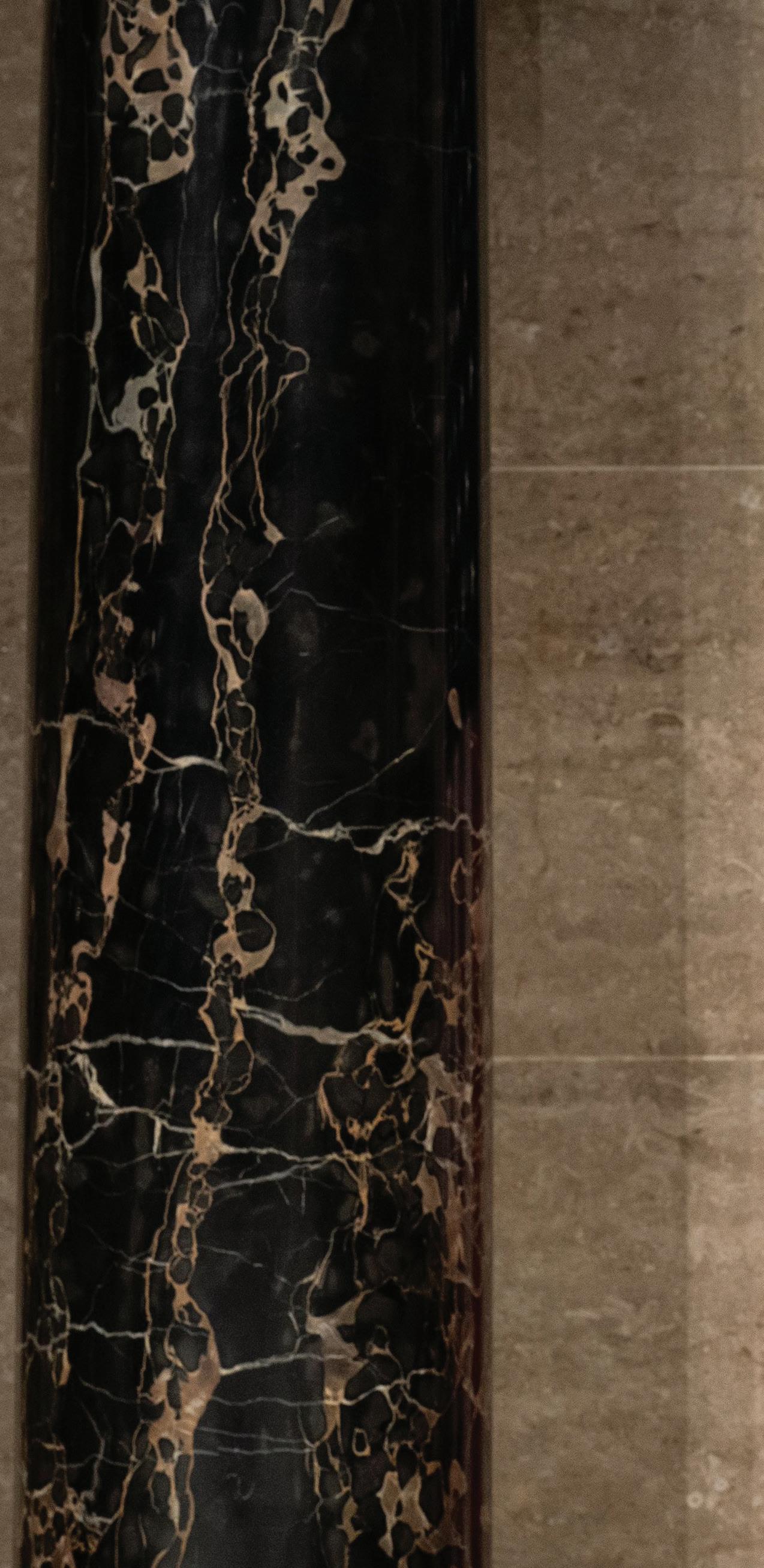
ONE MONTH BEFORE THE U.S.
Capitol was sacked by rioters, Speaker of the House Nancy Pelosi returned to The Commonwealth Club for a virtual conversation about the election and priorities for 2021. From the December 9, 2020, online program “A Conversation with Speaker Nancy Pelosi.” NANCY PELOSI, Speaker of the U.S. House of Representatives; Representative, California’s 12th District (D-San Francisco) In Conversation with Dr. GLORIA DUFFY, President and CEO, The Commonwealth Club of California
Nancy Pelosi, speaker of the U.S. House of
Representatives, wields the gavel. (Photo by Speaker Pelosi’s office.)
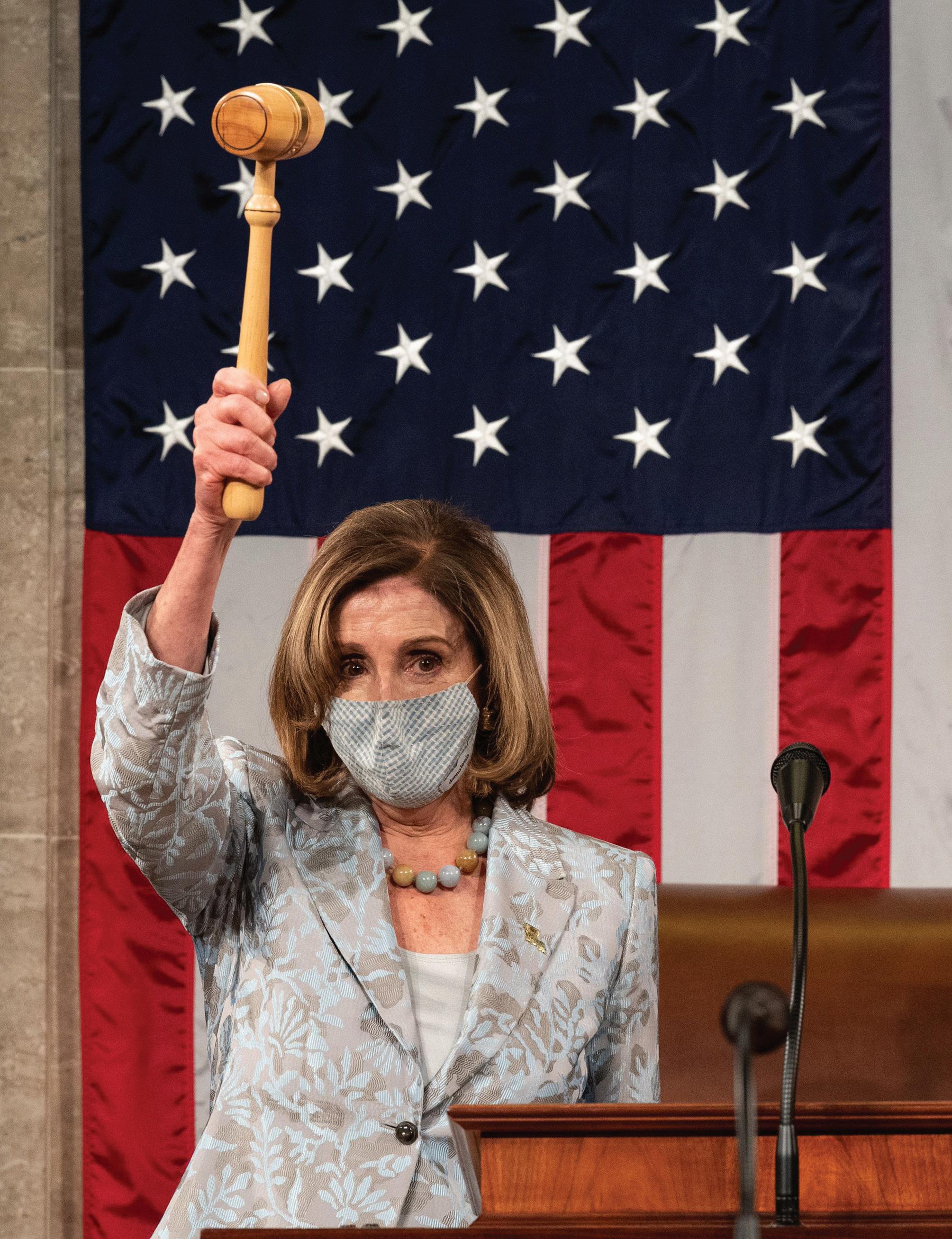
many Russian vehicles were there or Russian parts or this or that. She was [not doing] what we were doing, [which was] having an impression; but she was collecting data that would be very helpful in how we would go forward. So I’ve been in awe of her for decades, and I’m so proud that she’s at The Commonwealth Club.
Speaking of going back years, today, as many of you know, when we’re filming this—not maybe when you’re seeing it—is the 79th anniversary of Pearl Harbor, a date that would live in infamy, as president Roosevelt said following that.
It’s important to mention now, as the country came together and united to fight our foe and to win. In doing so, we lost about 291,000 [in combat]—that’s the number of record—Americans in World War II. Right now we’re over 280,000 people who have died of the coronavirus. Millions infected, but over 280,000 [dead], well on our way to surpass the number of Americans who died in World War II.
It is absolutely essential that we come together in a united way to fight this virus, which has made such an assault on the lives and the livelihood of the American people. And we must do it in the most sciencebased way. Science-based—not despising it as a hoax, or delay, denial, distortion or anything—but based on science. Right now in Congress, we’re working on legislation to take us into the next administration, which will be soon.
The whole dynamic of our debate has changed, because we have a new president who is interested in science, just scientific decisions and recommendations of “wear your masks,” socially distancing, testing, tracing, treatment, and the rest that have been ignored. Also we have a vaccine. It’s pretty exciting. In a few days, the committee will . . . move forward the Pfizer vaccine, and in another week, the Moderna vaccine.
Before you know it, the governor has a plan on how we would receive what comes to California. But the vaccine is not an answer for everyone right now. We have to take science’s view on how we go forward.
Nancy Pelosi thanks members of the National Guard who were called in to protect the U.S. Capitol following the January 6, 2021, insurrection. (Photo by Speaker Pelosi’s office.)
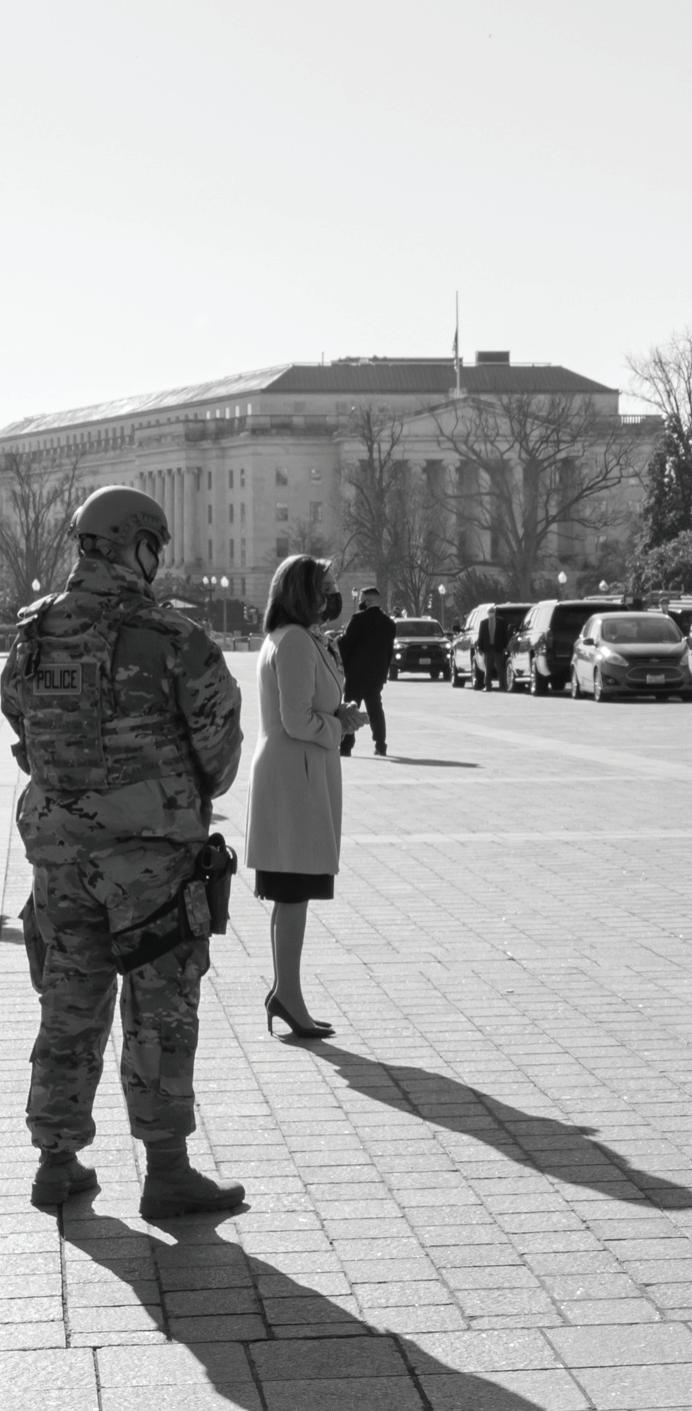

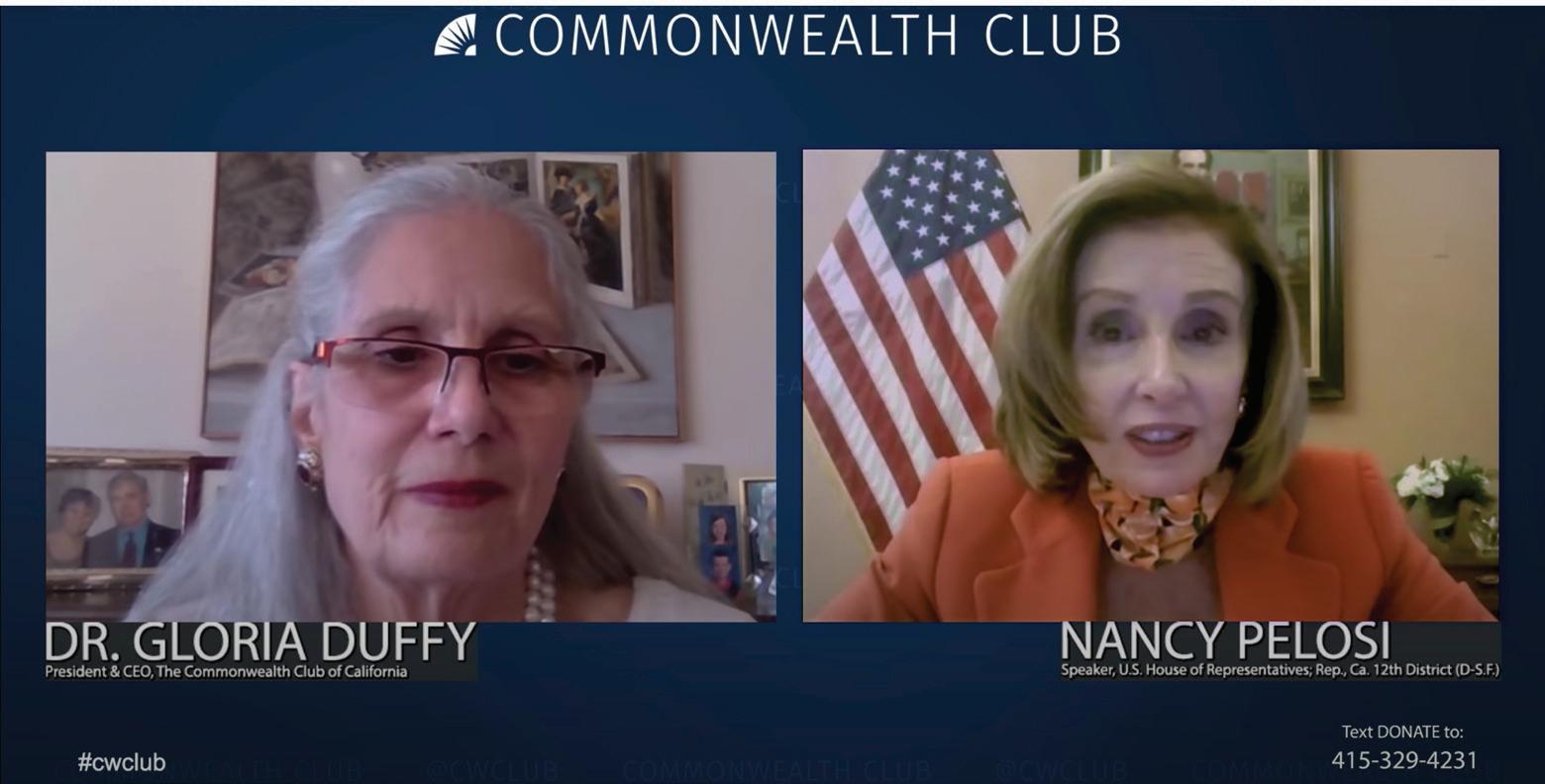
I’m so excited about the fact that whatever the party of a person, it’s about science. It’s about the future. DUFFY: Thank you, Madam Speaker. And thank you for your kind words. I knew on that trip to Central America that you were headed for great things, and I could see the dedication, the grit, the intensity that you’ve brought to your job. So thank you for your service.
What do you think about American leadership? We’re a bit beaten down at the moment by this virus, and our political troubles and so on. What do you envision for American leadership, especially on the global scene? PELOSI: Well, American leadership is absolutely essential in the world, because of who we are: this great country, an economic giant, of security, and the democracy, which is the strength of our country. The freedom of expression of ideas. [Former Secretary of State] George Shultz would say that in countries where you can have freedom of expression, you’ll have a better product than where it is suppressed.
Multilateralism has been central to our leadership in the world. Respect for NATO. Respect for all of the institutions that came forth at the end of World War II, but needing to be refreshed and reviewed to see how they meet the needs [of today].
Climate change is an issue that affects everything. It’s about our national security. Our national security experts tell us we must address this issue if you’re going to be safe. Security-wise, you must address this issue if we’re going to [have] safe, clean air, clean water, protecting the planet physically. It’s about jobs, it’s about a green new technology—we must be preeminent in the world. So it’s clear in that issue where America has been so much in the lead in protecting the environment and now protecting the planet.
But it goes beyond that as well and to multilateralism being very important economically and [for] national security. So when we as congresspeople visit a country, we have a purpose. Our purpose is about our national security. It’s about economic security. And it’s about governance. It’s about being a good example to the world of governance, ending corruption, honoring democracy and the voice of all people.
So the values that we have in that respect are not by dictating to others how we think they should behave, but by the power of our example. We’ve been told over and over again—in the last year I’ve been to Normandy for the anniversary [of the D-Day invasion 75 years ago]; I’ve been to [commemorations of] the Battle of the Bulge, 75 years; I’ve been to [commemorations of] 75 years of the freeing of Auschwitz, to Israel to celebrate that; to Munich for the Munich Security Conference. In all of those places, those countries are saying America is essential to global security, to global peace. DUFFY: It’s nice to have positive thoughts like that as we come out of this pandemic and this crisis.
We’re in an interim period right now with the election of [President-Elect Joe] Biden and [Vice President-Elect Kamala] Harris. But with President Trump still in office, how do you feel about the state of the country right now in this interregnum? PELOSI: Well, I’m counting the days until we have a new president. I’m disappointed that my colleagues in Congress have not had the patriotism to say the election is over. I think 27 of a couple hundred [Republican] members have said the election is over. But anyway, putting that aside, one of the things we’re trying to do now is to keep government open. We’re in negotiation on an omnibus bill to do just that, as well as a COVID package to include in that, to take us into the future.
This COVID package is different, because we have a new president who does care about science, and we have a vaccine, which gives us hope. But in the meantime, we still have to take precautions. Again, part of what we want to do that is different from that is to return to [focusing on] better health care, lowering the cost of health care by lowering the cost of prescription drugs, honoring pre-existing condition benefits, etc. Bigger paychecks by building infrastructure; of American [leadership in environmental policy] to take us into the future; and cleaner government. The public [should] have confidence that their voice is as important as anyone else’s, [so we are focusing on] reducing the role of big, dark money in politics.
So that’s the path that we’re on going into the next election. I’d really rather not spend too much time on the current, soon-to-be-ex, president of the United States. Upward and onward, let’s go into the future.
But right now, one of the fights that we have that is very important and relevant to this discussion is in our Appropriations Bill; we’re trying to stop the president from ending the civil service and firing the people who are not political appointees, just people who were at these agencies that he just doesn’t want to have there, replace them so that Biden’s opportunities are tied down. As I said, these are not political appointees. These are civil servants who are public servants, who’ve dedicated their lives to civic responsibility. But he wants to end that, just another example of the disrespect.
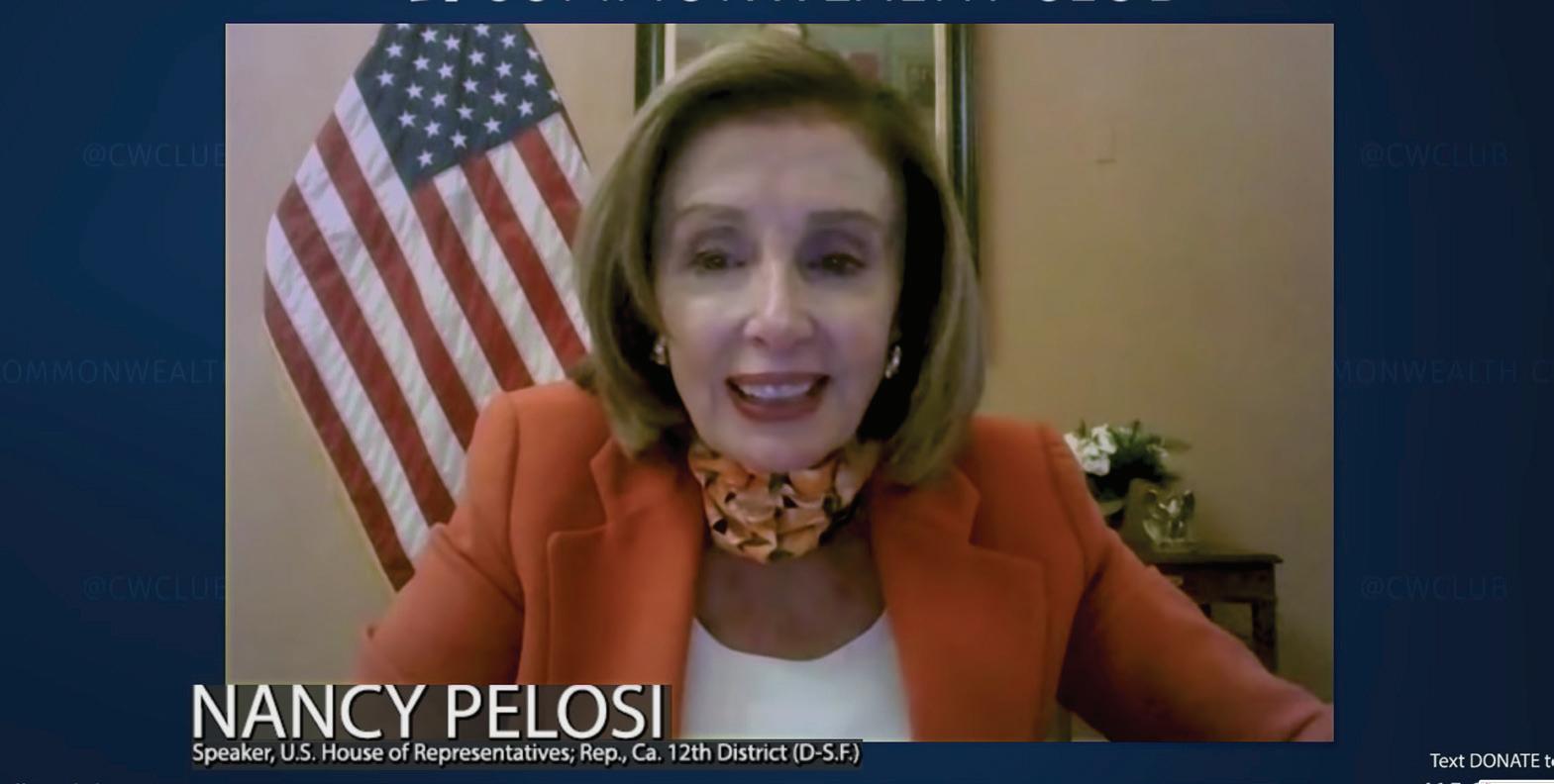
DUFFY: So what are the remedies to protect the civil service? PELOSI: There are a certain number of employees that our new president hires. But the scientists, for example, at the FDA, they’re not making political decisions. They’re not hastening a process because the president wants a vaccine sooner, [before] it has gone through the clinical trials and passes all the tests that it’s safe and that people have confidence in it or they won’t take it. Just to use that as an example, and that’s one of the places that he wants to do this.
So the morale in the government—of people who are there, one administration to the next—again, scientists and the rest know that their jobs are protected as they are doing the right thing and not catering to one party or the other. We are trying to put in the Bill of Appropriations [something to prevent] the president [firing those civil servants]. Say you worked at one of these places and you’ve been a scientist there a long time or an economist at the Office of Management and Budget, or just name any place. You’re being told you’re going to be fired because we don’t like the decision of your department. Well, you can lose your benefits. You can lose everything. You don’t want to quit your job, but you have a family to provide for. So this is very undermining of our democracy and of our civil service; no president should go to that place. But we’re trying to stop it in our Appropriations Bill really soon. DUFFY: Terrific. I’ve had that experience myself coming in as a presidential appointee in the Clinton administration and into the Pentagon, where there was an attorney, there was a budget expert, there was a Navy commander. There were policy experts, all of whom were in place in the civil service for me to come in and work with them on dismantling weapons of mass destruction in the former Soviet Union.
And they did the bulk of the work. They had the history and they knew how to make the budget work and the Pentagon and so on. So these civil service employees are absolutely essential to the functioning of our government for big, bold projects too, where a new administration needs to come in, hit the ground running and try to get important things done. Just building on that, what are your legislative priorities in general between now and the inauguration? PELOSI: I named some. Because our agenda, when we won the House in 2018 continues to be our agenda. For the people: lower health-care costs, bigger paychecks, building the infrastructure, cleaner government. In addition to that, though, and I’m not saying this is between now and the inauguration, but in the course of that time, we had passed all these bills in the House. Now they’re sitting on [then-Senate Majority Leader] Mitch McConnell’s desk. Mostly all of them had bipartisan support.
And for the people: cleaner government, [the] Moving Forward Act, which is building the infrastructure in a green way. Lower drug costs, that’s H.R. 3. H.R. 4, Voting Rights Act. The Voting Rights Act, why would they not pass the Voting Rights Act? The Equality Act. The Equality Act removes discrimination in everything in our lives for the LGBTQ community. It has bipartisan support.
Or the Dream and Promise Act to save our Dreamers, but also to go beyond that for a fair immigration policy, where everyone can reach his or her fulfillment. Remembering that our immigrants are the constant reinvigoration of America. It’s who we are as a nation, a nation of immigrants. Let’s appreciate that rather than denigrate it. Then the Paycheck Fairness Act, Women in the Workplace, all those things. The Violence Against Women Act. And then— very important to us—H.R. 1, which is the background check legislation we introduced on the eight-year anniversary of Gabby Giffords being shot in her district and people dying from that. Eighty-something percent of the American people support background checks, common sense background checks, including hunters and NRA members and the rest. It’s just some people in D.C. who were the handmaidens of the gun lobby that won’t let that go forward.
And then Climate Action Now. The Climate Action Now legislation we passed, and we have proposals to implement that.
So that was sort of an array. But really, all of it is about jobs. It’s about ending inequality in our country. It’s about good paying jobs, access to health care, ending disparities. And our overarching theme for all of us will be how do we make our system—our capitalist system, our free-market system—work for many more people in our country? Fairness in our economy in terms of opportunity and respect for the value of work. DUFFY: So in the shorter term, as you know now with everything closing down again, at least out here in California, there’s a lot of suffering going on. Small businesses, employees, people laid off, etc. How are things looking for a package of assistance? Is it likely? If so, when? PELOSI: Well, we have to have something. As I said, we’re viewing this in a different light now. We know that we’ll have to have a bigger bill in a matter of a month. So right now we can settle for a smaller package as we go forward that has recognition that on December 26, unemployment benefits will

stop. That can’t happen. We protect the American people from that.
The issues that relate to state and local government [include] . . . the providers of our existence, whether it’s health-care providers and public health facilities or police and fire, our first responders, who are some of the first on the scene for some with COVID. Teachers, transportation, sanitation, health, again, health and food workers who make our existence possible. We have to have those resources in the bill. So it’s honor our heroes. They are our heroes.
Address the virus and put money in the pockets of the American people. We still have some opposition, because there are at least 25 senators of the 50 Republicans who do not want to spend one more penny on the COVID virus. So that’s a problem. But we’re trying to work it through and to do so in a way, again, that recognizes more help is on the way.
We need to have the money there to purchase the vaccine and to take it from the lab to [deployment], from vaccine to vaccination and the states getting what they need to facilitate that. Well, I just got off [a call] with Senator [Richard] Shelby, who’s the Republican chair of the Appropriations Committee in the Senate and Nita Lowey is the Democratic chair in the House. [Lowey did not run for reelection in November 2020— Ed.] And basically we just said, let’s move faster to get this done and put some of our differences aside for another day. DUFFY: That sounds wonderful. What about gridlock in general though? As we move forward, do you think we’ll continue in this situation of gridlock? Do you think that there are realistic ways to break it and nurture this idea, “Let’s work together for the common good”? PELOSI: Well, let me just say—and this will sound the way it will sound—it isn’t about gridlock. It’s about obstruction. It has been about obstruction of whatever. When President Obama was in office, the Republicans were going to obstruct whatever he did. When we were in power, we passed the Affordable Care Act. We did so many things. ARRA, the American Reinvestment and Recovery Act. We did so many things.
But they won the majority. They were anti-science, anti governance, because they don’t really believe in governance that much. And [they were] anti-Barack Obama. So they had a trifecta going to make sure that there would be no scientific reason for them to act as a government, because they don’t believe in science and they don’t believe in governance. If Obama suggested, and he was very non-partisan, [the Republicans opposed it]. Why go to Washington to block what might be possible?
People say it’s gridlock. It’s gridlock because of obstruction. And you have to come respecting the institution that you serve in. That you’re there to make compromises, to be transparent and bipartisan, to have confidence in your ideas, but humble enough to listen to other people. I think Joe Biden is the perfect messenger for all of this.
He believes in reaching across the aisle. He knows that if you’re going to have a longterm, sustainable solution, you should try to have as much support for it as possible. So he is our messenger of hope, of trust—the currency of the realm. And his authenticity, his connection to the American people, especially America’s working families, is such that I think that the antidote to gridlock is public involvement.
President Abraham Lincoln [said], “Public sentiment is everything. With it, you can accomplish almost anything. Without it, practically nothing.” I keep saying this over and over. In order for public sentiment to weigh in, people have to know. And I hope that President Biden and Vice—are we excited about Kamala Harris? I certainly will have the opportunity to share with the American people in a respectful way how we all need to work together for the people. DUFFY: Let’s turn for a moment to racial justice. You talked about public support and so on. There’s a lot of pain and a lot of anger in the country about racial injustice. What is on your agenda and the agenda of the Democratic Party to ameliorate racial injustice? PELOSI: For the People Agenda and a cleaner government, that H.R. 1, part of that agenda is our George Floyd Justice and Policing Act, which captures some of what needs to be done. We believe that we have witnessed a lynching right before our very eyes in our country. We respect our men and women in blue who risk their lives to protect us, whether it’s police and fire, whatever. But we do know that there are some improvements that need to be made. This legislation goes to that place. Karen Bass, the chair of the Congressional Black Caucus, honchoed this. We thought it was reasonable and would be accepted by the Senate. But the Republicans there just said, “We like the language, but we don’t like the execution.” So we couldn’t come to terms.
But hopefully we’ll be able to do that now with the idea that we would have a presidential signature. Because the issue of racial and criminal justice permeates our society. We have to address it. I’m just using one example that addresses the Justice and Policing Act. But this is an issue of the highest priority in our caucus.
And let me just say about [the Democratic] caucus: Our caucus is over 60 percent

women, people of color, LGBTQ. So when you look at our Congress and you look on one side, you see the beautiful diversity of America, and the other side, not quite so. But in our side, you have the intellectual resources of people who have worked these issues over the years. Again, issues of racial and criminal justice are very much on the forefront of their knowledge, their experience, and their suggestions on how to get the job done. DUFFY: President Biden has made his bywords “Build Back Better.” What do you think that means? And what will America look like a year from now once the vaccine is widely distributed? How much different will it be and how can we Build Back Better? PELOSI: Well, I love Build Back Better. Our name for our bill, which is similar to his initiative, was called Moving America Forward. But in order to move America forward, you do have to build back better. The essence of that is that as we build, we’re not replacing what was there. We’re taking it further down the road. It’s a perfect slogan. The issue of rebuilding America in terms of our infrastructure has not been partisan.
That’s why when we did our three initiatives—lower health-care costs, bigger paychecks, building infrastructure—we thought we were going into nonpartisan issues. It didn’t work then, but now it should. Because the American people in all of the country, they know that we need to build back better.
They need to know that we need not only roads and bridges, which have been the traditional infrastructure, we need mass transit. We need high-speed rail. We need infrastructure for communication. We need the water systems to be replaced. Some of them are a hundred years old, made of brick and wood. Would you like to have a drink of water from that? In order for us to have the infrastructure that enables us to have remote learning, to have telemedicine, to have commercial transactions, to visit with family and friends, we need the infrastructure for broadband and the grid and the rest that goes with that.
So this is to take us into the future and to be benefiting from all that we had learned in technology and the rest on how to go forward. It’s a pretty exciting prospect. It shouldn’t be in any way partisan. They may not like the green aspect of it, but there are certainly plenty of other aspects of it that they know. In other words, we’re talking about driverless cars, things like that. And we have to engineer the roads in that way.
I want to just make this point about that. When we do this, it is essential that we invest in our people to have the workforce development necessary. That has to be women, people of color, Native Americans, veterans, rural Americans, everybody pitching in so that they not only have better paying jobs, that they have equity.
So it’s a private sector initiative and a public-private cooperation as we go forward. It’s pretty exciting. It’s all overdue. We tried to do it under President Obama, but we were restricted by a certain whatever on the other side. Now hopefully the American people, when they know how they can be benefited, will support that.
And again, it has to be paid for. We’re fiscally sound. How do we go forward in a way that does not further in-debt our children? But recognizing the most important investment we can make is education, early childhood, K-12, higher ed, post-grad, lifetime learning for our workers. Nothing brings more to the Treasury than education. Nothing brings more to our economy than the fullest participation of everyone to his and her best advantage. DUFFY: We’re so lucky to have some of your time on such a busy day. I just want to ask you one more question very briefly. We’re going into the holiday season, such a tough time for the American people. What words of hope or counsel do you have for the American public at this time? PELOSI: It is a sad time. I mean, I miss hugging my grandchildren and I miss going to church. They’re my two main misses. So I know how sad it is for so many families across the country. But I want them to be hopeful, to know their power, to protect the power, to protect themselves. And again, to know that help is on the way. That’s for sure. I had always hoped that that would be the case. Now I’m sure that it is.
You can’t possibly understand what goes on in a family’s home, but we have some appreciation of what the needs are. And again, as we go into that period of time, over 280,000 Americans have lost their lives, many unnecessarily to this virus. Our thoughts and prayers are with those families. Millions of families affected by infection and hopefully not in the long haul of it all.
I want those families to know that if they’ve lost their loved ones, we’ve carried them in our hearts and our prayers. It’s about lives, livelihood and the life of our democracy. That is what this assault has been on. And as we provide solutions, they have to start right at the kitchen table of America’s working families to address their needs and their concerns.
That is the first and was first and foremost on our agenda as we have these debates. That’s why sometimes it’s harder to reach conclusions if we’re not all sharing that perspective. But know your power to protect yourself. Know your power to make a difference in public policy so that this never happens again.










